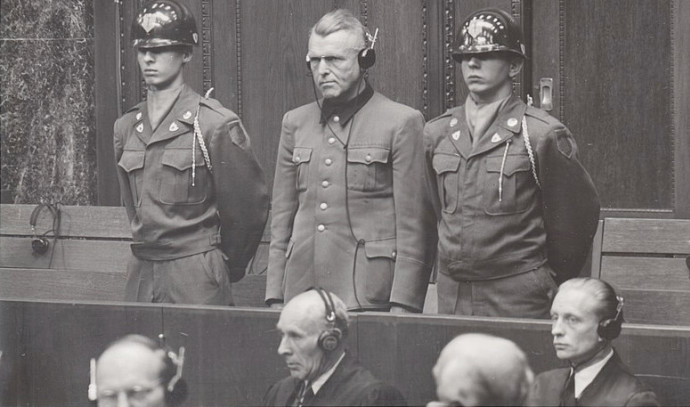A commission established by Britain’s The Lancet medical journal produced a 73-page report on medical atrocities under Nazism and during the Holocaust – and their implications for today. The most comprehensive report issued to date, with 878 references, details the central role health professionals played in formulating and carrying out the antisemitic, racist, and inhumane policies and practices during the Nazi regime.
The commission debunks long-held misconceptions about medicine in the Nazi era, including the claim that medical crimes were carried out by only a few extremist doctors, or that perpetrators acted under coercion.
The report, written by 20 leading scholars from the US, Europe, and Israel, stresses the critical role institutions should play in ensuring the study of medicine, Nazism, and the Holocaust as part of required curricula for all health professionals. They called on universities, medical schools, research institutes, and other professional organizations to consider the evidence and recommendations in the report as they strive to strengthen medical education and ethics today.
The authors are from Germany, the US, Poland, Austria, Czech Republic, Spain, and Israel. The commission was co-chaired by Prof. Herwig Czech of Austria; Prof. Shmuel Reis of the Hebrew University-Hadassah Center for Medical Education; and Dr. Sabine Hildebrandt of Boston Children’s Hospital and Harvard Medical School.
The other Israelis on the team were historian Dr. Amir Teicher of Tel Aviv University; Prof. Avi Ohry of TAU’s Center for Rehabilitation Medicine; Dr. Matthew Fox of Ben-Gurion University of the Negev’s Jewish Medical Ethics center; Dr. Etienne Lepicard of the Hebrew University-Hadassah Faculty of Medicine; Dr. Miriam Offer of the Center of Jewish Medicine during the Holocaust at the Western Galilee College in Acre; and Dr. Tessa Chelouche of the Technion’s Rappaport Faculty of Medicine.
Holocaust atrocities contributed to the development of contemporary medical ethics
The Lancet’s editor-in-chief, Prof. Richard Horton, who convened the commission, stated that “the Holocaust – the systematic, state-sponsored persecution and murder of six million Jews by the National Socialist (Nazi) regime and its collaborators, is arguably the most extreme instance of crimes against humanity and genocide in history.
“During its reign of terror, the Nazi regime committed innumerable acts of violence against Jews, Sinti, and Roma, people with disabilities or psychiatric illnesses, political prisoners, prisoners of war, homosexuals, and others. A distinctive and disturbing feature of these atrocities is the important role that health professionals played in formulating, supporting, and implementing inhumane and often genocidal policies.
“After World War II, these crimes were important factors that contributed to the establishment of contemporary health professional ethics. Learning about, and reflecting upon, this history can have various benefits for learners and practitioners of health sciences, and the patients and communities they serve. Health sciences curriculums, however, rarely cover this topic.”
Using examples of discriminatory and inhumane medical policies and practices under the Nazi regime, the authors aimed to inform approaches to contemporary issues in medicine and underscore the importance of putting human rights and dignity in the center of medical professionals’ conduct, including a willingness to stand up to wrongdoing whenever and wherever necessary.
“While it is tempting to view the perpetrators as incomprehensible monsters, the evidence put forward by the commission demonstrates how many health professionals were capable of committing ethical transgressions and even crimes against their patients under certain conditions and pressures. Health professionals – who often care for people at their most vulnerable – have a unique and important duty to develop and preserve a strong moral agency,” the report continued.
“The Nazi regime is not the only instance in history in which members of the medical community were involved in crimes against humanity. However, it is one of the most extreme, well-organized, and extensively documented examples of medicine’s active participation in human rights violations – including antisemitism, racism, discrimination, mass atrocities, and genocide. As such, important implications can be drawn for today’s health professionals’ moral agency, especially under economic, political, or other types of pressure,” the report notes.
During the Nazi era, the medical community helped create, justify, and implement policies according to the Nazi doctrine and changed their understanding of medical ethics accordingly. Records indicate that physicians joined the Nazi Party and its affiliated organizations in higher proportions than any other profession, and Germany’s medical and research institutions played instrumental roles in the regime.
Throughout the commission’s report are examples of how the Nazi “ethical code” was weaponized as a tool to value, prioritize, and advance people of German “Aryan” descent above all others in medical care and research, as well as rationalize eugenics, forced sterilization, the “euthanasia” patient-murder program, and brutal human experiments.
Methods first developed and applied in the T4 patient murder program of 1939-1941, during which 70,000 institutionalized patients were killed by gas, were later applied to the extermination camps in Poland, where victims were murdered upon arrival in gas chambers disguised as showers.
It is often surprising how limited the knowledge about Nazi medical crimes in the medical community is today, perhaps apart from a vague notion of Josef Mengele’s experiments in Auschwitz, the authors wrote.
“In the aftermath of World War II, deliberations over medical ethics – including human rights-based medicine, health care, and voluntary consent in research – drew international attention. Starting in 1946, the Nuremberg Doctors’ Trial led to the first international principles for ethical research on humans, later to be known as the Nuremberg Code,” they recalled. “This formed the basis of many subsequent declarations and was an important factor in the development of modern bioethics.
“In life and death, the bodies of Nazi victims were used for research and teaching, and specimens of their human remains were sometimes kept in scientific collections for decades after the war. The Pernkopf anatomy atlas is an example of how Nazi research has become part of the canon of medical knowledge.
“Re-drawings of the Pernkopf images, some deriving from the bodies of victims of the Nazi regime, have been copied in many publications and atlases, often without reference to the original. Current understanding of aviation safety, hypothermia, and even the effects of tobacco and alcohol use on the body has also been informed by research in the Nazi era but, again, awareness of how the research was obtained is scarce.”
Accountability for and recognition that crimes were committed in the name of medicine in the Nazi era and during the Holocaust “remains woefully inadequate. Medical students, researchers, and practicing health professionals should know where – and from whom – the foundations of medical knowledge come from. Victims of Nazism are owed that; they have a right to be honored and treated with dignity in life and death for coerced contributions to medicine as we know it today.
“The goal of our report is to provide additional resources and information for medical schools, research institutions, and medical associations worldwide to continue accountability efforts as part of their responsibility to past and future generations,” Reis declared.
Among the recommendations were to:
- Incorporate the study of medicine, Nazism, and the Holocaust in curricula for all medical students and health professionals, across the medical field and in continued medical education initiatives.
- Encourage students and medical professionals to develop a history-informed professional identity, including being able to recognize their own potential biases or conflicts of interest, challenge hierarchies, and equip them with the tools necessary to overcome them.
- Universities, psychiatric hospitals, and other medical institutions worldwide should actively identify and commemorate victims of Nazi medical crimes and initiate research to better understand their direct connections to human rights violations in the past. They should also look at their own past, identify and document patterns of medical abuse, and integrate this history in their curricula.




